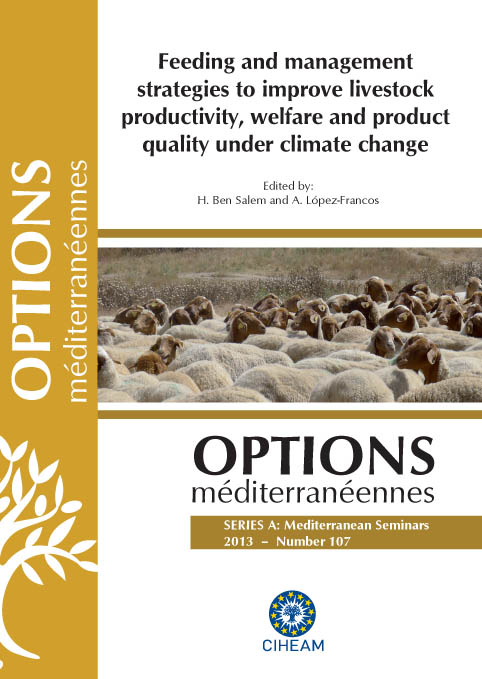| Article précédent | p. 183-187 | Article suivant |
In vitro anthelmintic activity of some Mediterranean plants against Haemonchus contortus infective stage
The use of bioactive tanniniferous plants seems a promising alternative to control infections parasitic nematodes of the gastro intestinal tract in small ruminants. Both in vitro and in vivo studies, have confirmed the anthelmintic properties of several forage legumes, or tropical and browse plants. The aim of the present study was to evaluate the in vitro anthelmintic (AH) effect of 3 Tunisian plants (Trigonella foenum graecum, Periploca angustifolia Labill., Ceratonia siliqua) on Haemonchus contortus infective larvae. The larval exsheathment inhibition assay (LEI) was used to determine the potential inhibitory effects of 5 plant extracts at different concentrations (1200, 600, 300, 150μg/ml). The inhibition effect at the highest concentration ranged between 82.97-100% for C. siliqua (leaves), P. angustifolia (pods and leaves), T. foenum graecum (whole plant) and at 53.5% for C. siliqua (fruits). The possible implication of polyphenols and/or tannins in the anthelmintic activity was showed after measuring the total phenols, total tannins and the biological activity of the extracts tested.
L'utilisation de plantes bioactives riches en métabolites secondaires, comme les tannins, semble une alternative pour la lutte contre les nématodes parasites gastro-intestinaux chez les petits ruminants. Des études, in vitro et in vivo, ont confirmé les propriétés anthelminthiques de plusieurs plantes légumineuses fourragères, tropicales ou de plantes de parcours. L’objectif de notre étude était l’évaluation in vitro des effets anthelminthiques (AH) de 3 plantes tunisiennes (Trigonella foenum graecum, Periploca angustifolia Labill., Ceratonia siliqua) sur les larves infestantes d’Haemonchus contortus. Le test d’inhibition de dégainement larvaire a été utilisé pour déterminer les effets anthelminthiques de 5 extraits de plantes aux concentrations suivantes (1200, 600, 300, 150 μg/ml). L'effet d'inhibition de dégainement, à la plus forte concentration utilisée, a varié de 82,97-100% pour C. siliqua (feuilles), P. angustifolia (gousses et feuilles), et T. foenum graecum à 53,5% pour C. siliqua (fruits). L'implication possible de polyphénols ou/et de tannins dans l'activité anthelminthique a été soupçonnée après avoir mesuré les phénols totaux, tannins totaux et l'activité biologique des extraits testés.
- [ Afficher ]
- [ Télécharger ]
- [ Exporter la citation ]
Vous pouvez télécharger la citation au format :
- [ Imprimer ]
-
Mots-clés
LARVE, STADE DE DEVELOPPEMENT, TANNIN, TUNISIECiter cet article
Aïssa A., Manolaraki F., Pardo E., Znaïdi I.A., Ben Salem H., Kraiem K., Hoste H. In vitro anthelmintic activity of some Mediterranean plants against Haemonchus contortus infective stage. In : Ben Salem H. (ed.), López-Francos A. (ed.). Feeding and management strategies to improve livestock productivity, welfare and product quality under climate change. Zaragoza : CIHEAM / INRAT / OEP / IRESA / FAO, 2013. p. 183-187. (Options Méditerranéennes : Série A. Séminaires Méditerranéens; n. 107). 14. International Seminar of the Sub-Network on Nutrition of the FAO-CIHEAM Inter-Regional Cooperative Research and Development Network on Sheep and Goats, 2012/06/15-17, Hammamet (Tunisia). http://om.ciheam.org/om/pdf/a107/00007030.pdf



